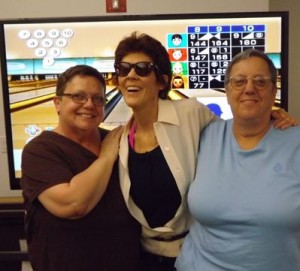Today is National Senior Citizen’s Day, which is a great opportunity to look at the role age and aging play in all of our lives. Many people are familiar with terms like racism or sexism—but here at SAGE we spend a lot of time thinking about ageism. Ageism is the act of stereotyping and forming prejudices about people or groups based on their age. It can take many forms, from assuming that all teenagers are irresponsible to passing over an older adult’s job application because of their age.
 One important way that we combat these different ‘-isms’ is to learn how to speak to others with respect and understanding. The language we use in our everyday lives has a tremendous impact, not only on our personal relationships, but on the national conversation around diversity and inclusion. For example, when I’m conducting our LGBT cultural competency trainings, I have all the participants say ‘LGBT’ out loud four or five times. After this activity people that have never even said the word LGBT can say it smoothly and without stumbling over the letters, which is an important way to demonstrate that you’re an ally to the LGBT community!
One important way that we combat these different ‘-isms’ is to learn how to speak to others with respect and understanding. The language we use in our everyday lives has a tremendous impact, not only on our personal relationships, but on the national conversation around diversity and inclusion. For example, when I’m conducting our LGBT cultural competency trainings, I have all the participants say ‘LGBT’ out loud four or five times. After this activity people that have never even said the word LGBT can say it smoothly and without stumbling over the letters, which is an important way to demonstrate that you’re an ally to the LGBT community!
Given the power of language, today is a great time to explain why SAGE chooses not to use the term “senior citizen” in our work. Calling someone a senior citizen places them into a category simply based on their age. Along with this category come many other assumptions about what older adults can and cannot do.
‘Senior citizen’ is just one of a few terms used to describe older adults that are increasingly rejected. A 2012 article in the New York Times discussed this shift in language, noting that other terms like ‘elderly’ are also falling out of favor.
Whatever the label, anytime you see someone first and foremost as a member of a group, it makes it more difficult to see that person in all of their uniqueness. At SAGE we strive to see everyone as individuals with their own strengths and weaknesses, not just as members of a certain generation. Removing ageist assumptions or language for our collective vocabulary is an important part of doing our work, and that’s why we don’t call our constituents senior citizens.
There may be times when it’s very important to talk about older people as a group, and in those moments we prefer the term ‘older adults’. It allows us to speak to a set of shared experiences, without bringing along a lot of the baggage and stereotypes associated with ‘senior citizens’.
After all, as one style guide points out, we don’t refer to people under age 50 as ‘junior citizens,’ so why create a special category just for older people?
What term do you use to describe yourself? Which terms do you love, and which do you dislike? Let us know in the comments!
Posted by Tim Johnston, PhD. Tim is Manager of Education and Training for Services & Advocacy for GLBT Elders’ National Resource Center on LGBT Aging. The opinions expressed in this article are those of the author and do not necessarily reflect those of the Diverse Elders Coalition.
This post originally appeared on the SAGE Blog.

